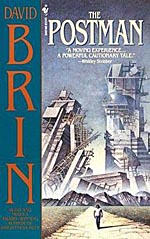
![]() couchtomoon
couchtomoon
4/2/2016
![]()
There's something mythical about the persistence of the U.S. postal service which even still manages to carry on alongside the ever-expanding models of privatized shipping, especially in this age of digital communications and industrial shipping accounts. Even C.M. Kornbluth satirized those uncanny postal promises to weather any misery, his mail girl's bureaucratic duty surviving without a hiccup during the Soviet occupation of the U.S. in his Cold War satire Not This August (1955). I assume Terry Pratchett beat the joke to death in Going Postal (2004). David Brin also exercises this confidence in the power of postal bureaucracy, imaginary though it may be, in his post-apocalyptic, Earth Abides-tribute, The Postman (1985), in which a post-civ loner, Gordon, stumbles upon a wrecked mail truck in the spring of nuclear winter and adopts the persona of a mail carrier to make favor with budding, hair-trigger communities of the ruined western United States.
It's actually a humorous premise, this dystopian Johnny Appleseed of mail, and probably one that would be more successful in the hands of a deft SF satirist. In Brin's hands, the notion is just too earnest with Gordon traipsing into these post-apoc cloisters, collectives, and mini-despots, restoring patriotism and, subsequently, order to a post-nuclear winter west coast. The US government is no more in this dilapidated world, no mail service, either, but Gordon's presence in these communities, with his misleading mail carrier uniform and bag full of never-delivered letters, and his lies about the survival of the United States government, is just enough to replenish American faith and empowerment. Gordon is a hero to these communities and a threat to their oppressors; his patriotic message-delivering superpowers will deliver them from the stagnation and oppression of insularity. A postal Jesus.
(But it's impossible not to imagine Kevin Costner (thanks to the movie posters), which brings a smarmy artificiality to Gordon's character that was likely not Brin's intention, but I almost prefer it to the original Gordon's naive sincerity.)
Of course, it's not so clean and Apple pie easy: Gordon's work has barely started by book's end, and the bad guys, the evil Holnists, named for author Nathan Holn, an Ayn Rand-type of the survivalist movement, won't give up power so easily. The Holnists are an added contrivance to an already flag-pandering tale, their depictions too shallow and orchestrated to foster interest, their motivations dubious and illogical in the grand scheme of their philosophy: Survivalists who communize. An individualist hierarchy. A dog-eat-dog cooperative. A rule-based violent chaos. Its stability is dubious; its evilness too assured. Suzy McKee Charnas Walk to the End of the World (1974) establishes a much more nuanced and humanized bad-guy dystopia. (Review forthcoming.)
Speaking of feminist dystopian fiction, this is one of Brin's earlier experiments with feminism, one area where Brin is more adept at capturing ambiguity, though it merits wondering if that's only because he's either so distant from or subconsciously uncomfortable with the philosophy that he is better able to portray the ambiguity that is so desperately lacking in his other themes. The feminist leader of this story is caustic and rigid, possessive and backwards (she calls her team "my girls" a lot). She impulsively leads "her girls" into a battle with the survivalists, resulting in the deaths of many women. I'm not sure what Brin is trying to say here, perhaps it ties into his overall critique of hierarchical leadership, but feminist-flavored mixed messages like these translate best as "I'm all for equality, but know your limits." Brin's 1993 YA swashbuckler Glory Season (1993) did a better job portraying a rounded (notice I didn't say 'well'-rounded), provocative vision of feminist society (hetero-centric though it may be; hierarchical though it may be) that makes for better food for thought- at least something better to argue about- whereas in The Postman, the message remains undeliverable.
But Brin's main aim in The Postman is to comment on the power of myth, invoking the imaginary nature of nationhood, leadership, and even the economy. That "free and brave" feeling carries on into the unwritten future of the tale, and, like any novel about a single person's journey, to deepen his mythic theme, Brin borrows Odyssean details throughout, the structure and chapter headings being obvious tributes. It's hard to complain that the survivalist Holnist monsters are too unreal when, Brin seems to argue, the United States is unreal itself. It only exists because citizens (and enemies) believe it exists.
The premise alone is enough to attract interest, though its stretched, uneven arcs (and its awkward attempts at feminist commentary) might not hold for long, and the patriotism is too old-fashioned and syrupy for readers in the age of GWOT. It's strange that this story managed to capture the attention of Hollywood, but it's not like '80s SF had much to offer, and this is one of those rare times when a book blurb inspires more intrigue than the actual book. (The title pun, is rather clever, too. Post-man.) I would make a "return to sender" joke right here, but it'll pass a long Sunday of no new book deliveries.
http://couchtomoon.wordpress.com